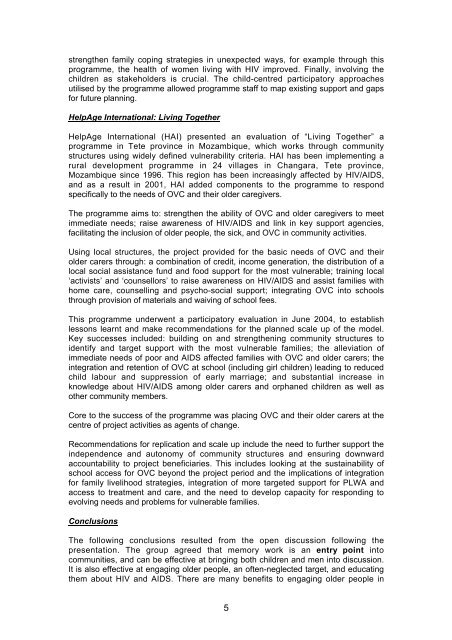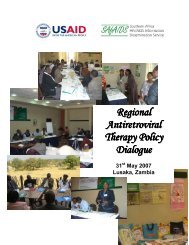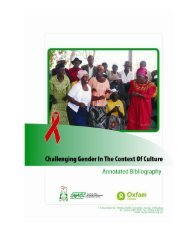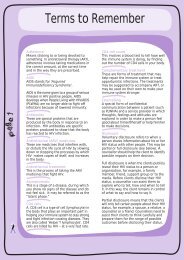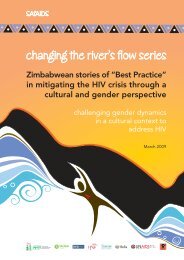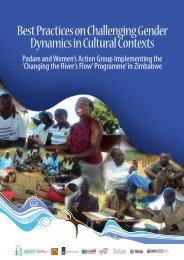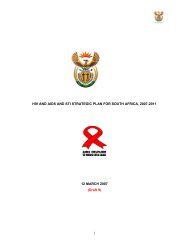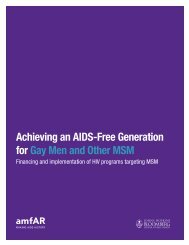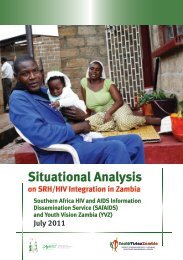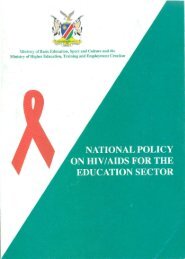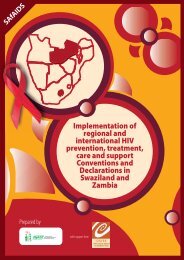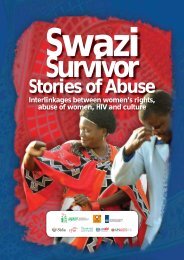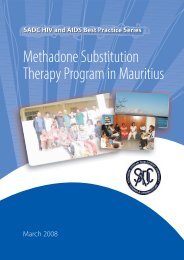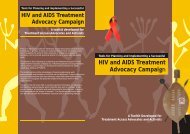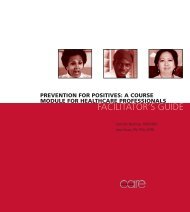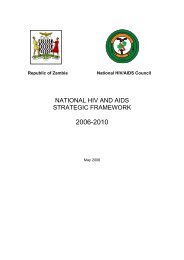2008 05 09 OVC Best Practices.pdf - SAfAIDS
2008 05 09 OVC Best Practices.pdf - SAfAIDS
2008 05 09 OVC Best Practices.pdf - SAfAIDS
Create successful ePaper yourself
Turn your PDF publications into a flip-book with our unique Google optimized e-Paper software.
strengthen family coping strategies in unexpected ways, for example through this<br />
programme, the health of women living with HIV improved. Finally, involving the<br />
children as stakeholders is crucial. The child-centred participatory approaches<br />
utilised by the programme allowed programme staff to map existing support and gaps<br />
for future planning.<br />
HelpAge International: Living Together<br />
HelpAge International (HAI) presented an evaluation of “Living Together” a<br />
programme in Tete province in Mozambique, which works through community<br />
structures using widely defined vulnerability criteria. HAI has been implementing a<br />
rural development programme in 24 villages in Changara, Tete province,<br />
Mozambique since 1996. This region has been increasingly affected by HIV/AIDS,<br />
and as a result in 2001, HAI added components to the programme to respond<br />
specifically to the needs of <strong>OVC</strong> and their older caregivers.<br />
The programme aims to: strengthen the ability of <strong>OVC</strong> and older caregivers to meet<br />
immediate needs; raise awareness of HIV/AIDS and link in key support agencies,<br />
facilitating the inclusion of older people, the sick, and <strong>OVC</strong> in community activities.<br />
Using local structures, the project provided for the basic needs of <strong>OVC</strong> and their<br />
older carers through: a combination of credit, income generation, the distribution of a<br />
local social assistance fund and food support for the most vulnerable; training local<br />
‘activists’ and ‘counsellors’ to raise awareness on HIV/AIDS and assist families with<br />
home care, counselling and psycho-social support; integrating <strong>OVC</strong> into schools<br />
through provision of materials and waiving of school fees.<br />
This programme underwent a participatory evaluation in June 2004, to establish<br />
lessons learnt and make recommendations for the planned scale up of the model.<br />
Key successes included: building on and strengthening community structures to<br />
identify and target support with the most vulnerable families; the alleviation of<br />
immediate needs of poor and AIDS affected families with <strong>OVC</strong> and older carers; the<br />
integration and retention of <strong>OVC</strong> at school (including girl children) leading to reduced<br />
child labour and suppression of early marriage; and substantial increase in<br />
knowledge about HIV/AIDS among older carers and orphaned children as well as<br />
other community members.<br />
Core to the success of the programme was placing <strong>OVC</strong> and their older carers at the<br />
centre of project activities as agents of change.<br />
Recommendations for replication and scale up include the need to further support the<br />
independence and autonomy of community structures and ensuring downward<br />
accountability to project beneficiaries. This includes looking at the sustainability of<br />
school access for <strong>OVC</strong> beyond the project period and the implications of integration<br />
for family livelihood strategies, integration of more targeted support for PLWA and<br />
access to treatment and care, and the need to develop capacity for responding to<br />
evolving needs and problems for vulnerable families.<br />
Conclusions<br />
The following conclusions resulted from the open discussion following the<br />
presentation. The group agreed that memory work is an entry point into<br />
communities, and can be effective at bringing both children and men into discussion.<br />
It is also effective at engaging older people, an often-neglected target, and educating<br />
them about HIV and AIDS. There are many benefits to engaging older people in<br />
5


